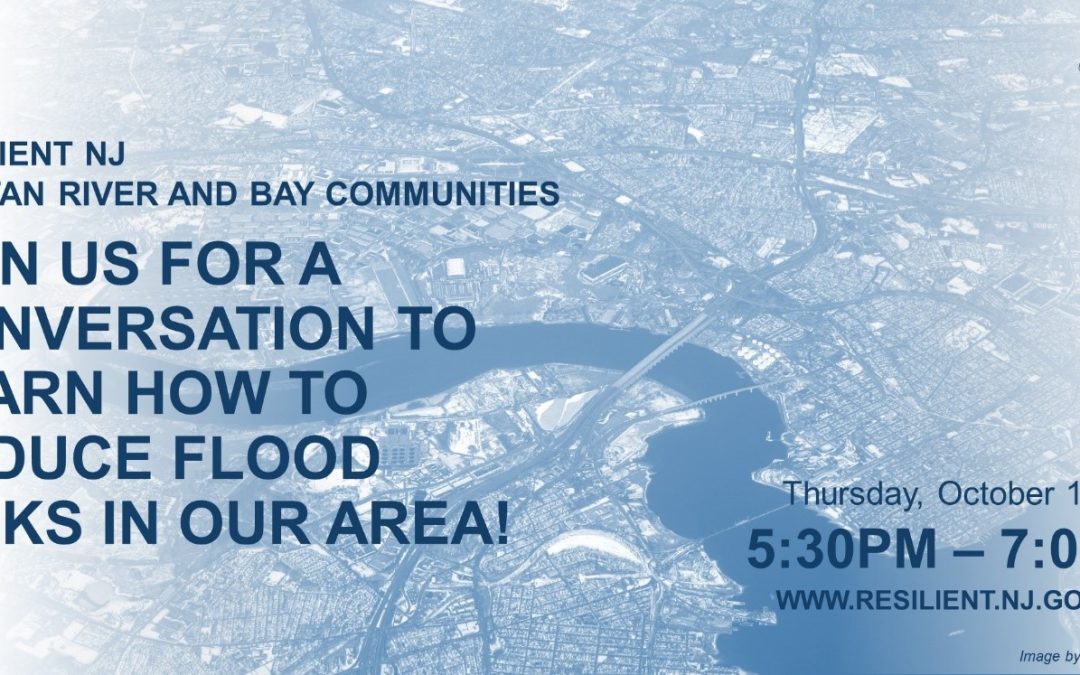Our first Community Meeting was held on October 14, 2021 to advance the regional resilience action plan to reduce flood risks in Raritan River and Bay communities: Carteret, Old Bridge, Perth Amboy, Sayreville, South Amboy, South River, and Woodbridge. The project team gave a presentation on the goals of the project and shared information about flood risk and community members joined breakout sessions to discuss how flooding affects daily life in your community, their long term goals for their community, and the factors we should considering when evaluating potential resiliency strategies.
The meeting was held from 5:30PM – 7PM and included live American Sign Language and Spanish interpretation.
WHAT DID WE HEAR?
All the feedback that we received at the Community Meeting is compiled in this virtual board. We invite you to explore the board and add your feedback! Instructions for adding comments are at the top of the board.
Here’s a summary of what we heard, by topic. If you feel that we’ve missed anything or got something wrong, we encourage you to let us know by emailing ResilientRRBC@dep.nj.gov or calling 732-661-3808.
We heard many stories about the impacts of flooding and secondary consequences.
Read about these experiences in our virtual board.
What are the most important things to accomplish for Resilient Raritan River and Bay Communities?
- Although climate change is expected to make flooding more common, flooding already is a serious problem across the region now. We heard that this project should include recommendations for immediate and intermediate actions that can efficiently reduce flood risks in the near term. Participants expressed that the project should aim to advance low hanging fruits that can be implemented quickly, while at the same time shifting towards proactive actions rather than reactive.
- While flooding is a major issue in the region, it is not the only problem. We heard that this project should aim to make recommendations that improve overall quality of life while addressing flooding. These improvements could include increasing waterfront access, reducing trash accumulation, reducing pollution, improving air and water quality, adding ecological benefits through green infrastructure, and serving the needs of local businesses.
- Occurrences of flooding seem to be happening more frequently and in unexpected places, impacting more people. Outreach to vulnerable populations, like those in senior, public and mobile housing, is an important outcome of this project for many participants. Education and initiatives should include information about risks and individual actions to improve resilience and should reach different groups, including youth, through a variety of channels and media.
- Actions to reduce risk will require help from the State and Federal governments. The impetus can’t solely lie on the municipalities. To that end, county and state laws and regulations may need to be updated to address flooding, especially flooding due to private development and land use changes.
What is the story we are getting from flood data and our experiences with flooding?
- Frequent flooding from rain events is the most prominent type of flood hazard experienced in the region. Some participants expressed that the flooding is largely related to overwhelmed combined sewer systems, which were not designed for the levels of intense rainfall that are becoming more common.
- We heard about some experiences of flooding during this meeting. Recent flooding created up to several feet of street flooding, stranded buses and cars, and flooded ground floors of homes. We also heard about the economic impacts of flooding because people stay in their homes when it rains, and concerns about long-term economic degradation resulting from increased frequency of flooding.
MISSED THE MEETINGS, OR WANT TO SHARE ADDITIONAL FEEDBACK?
Please visit our virtual board and add your own thoughts.
You can also check-out the meeting materials linked below.
View the presentation slide deck here
Recordings
Attended the meeting and have thoughts on how it went?
Take our meeting survey here.

